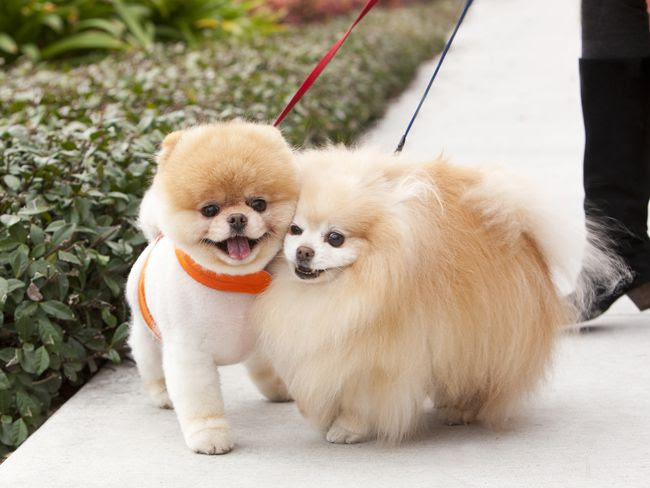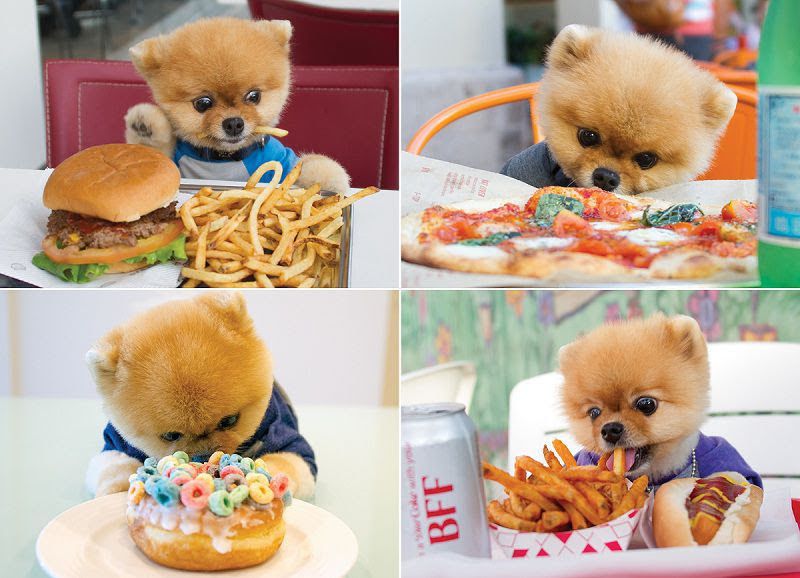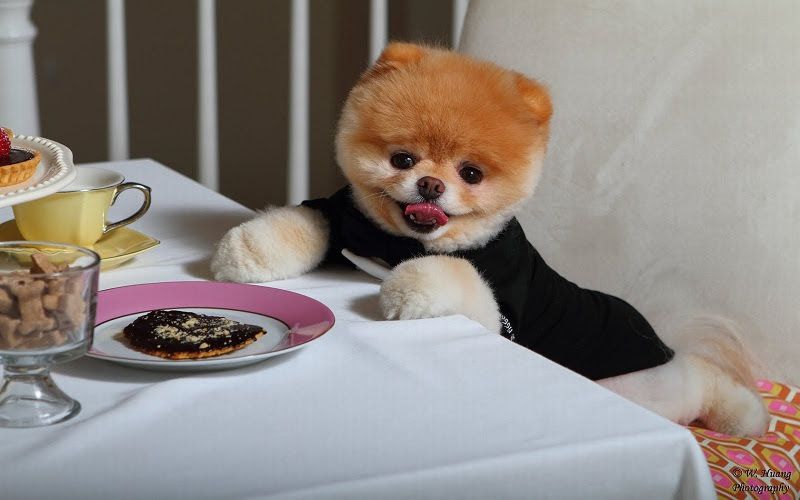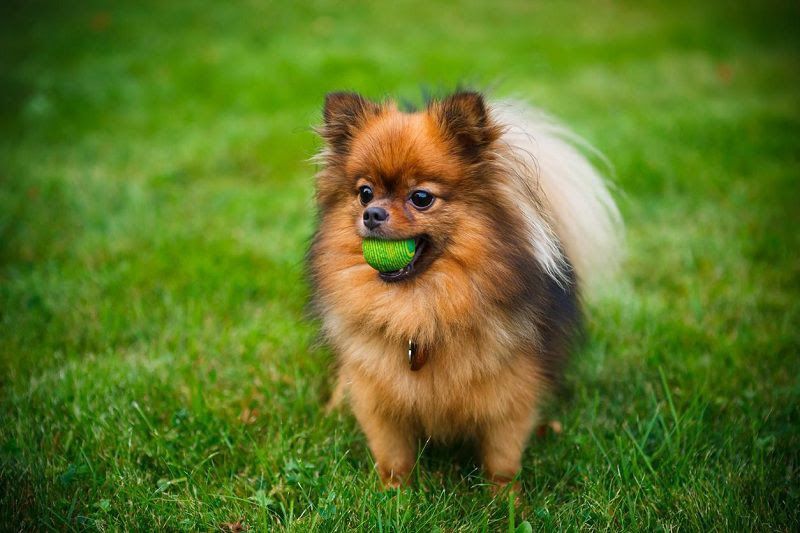Raising Pomeranians is not an easy task as they are born picky eaters. They do not like rice and vegetables. Although their favorite food is meat, organs and eggs, you have to force them to eat rice and vegetables, which are high in carbohydrates and vitamins, by grinding meat and mixing it with rice (or porridge) and vegetables (finely chopped) for better digestion. Poms are prone to early tooth loss, so you should have them chew on big bones to help strengthen their teeth.

Best Gifts for Pomeranian Lovers
[ux_products products=”24″ tags=”pomeranian-products” orderby=”rand”]How to raise Pomeranians?
With a small stature and a lovely appearance, the Pomeranian has enjoyed a great popularity all over the world. However, considered a noble dog, this breed is quite needy and difficult to take care of, as Pomeranians have been raised and pampered by noble families for centuries. Moreover, their long and thick coat requires high maintenance, which may be not suitable for everyone. This article will guide you through how to raise Pomeranians, including feeding, grooming and taking care of them.
Food for Pomeranians
Known as picky eaters, although Poms do not eat a lot, their food must be delicious and nutritious.
Commercial dog foods
Many people like to feed their dogs ready-to-eat food, which is tasty to most dog breeds, but contains a lot of fillers which has absolutely no nutritional value for dogs.
>> You May Also Like:
- Pomeranian puppy price. Where to buy pomeranian puppies?
- Temperament & characteristics of Pomeranian
- Best Front Pet Carrier for Small Dogs from 5 to 12 lbs

On the other hand, fillers are not completely useless. They help harden dog stools, or increase food’s porosity and crunchiness for dogs to chew easier. An amount of less than 10% filler in a food package is considered reasonable. Nutrition Facts (listed on the packaging) are something you need to care about. A good pack of food should contain 20 to 26% protein, 10 to 14% fat and less than 10% fillers; the rest are fiber, vitamins and other minerals.
Fresh food
Poms do not eat much, so all of their food should be nutritious. The best foods for Poms include:
- Meat. Meat is rich in protein and fat, both of which account for most of Pomeranians’ daily diet. As carnivores, they have a digestive system suitable for protein-rich diet (meat or organs). Their most favorite meat is beef. Although expensive, beef is high in protein and low in fat. Besides, chicken, lean pork and fish are also good for them.
- Eggs and organs. Eggs provide a lot of protein and less fat. Before feeding your Poms chicken eggs or duck eggs, you should boil, then smash the eggs to avoid choking. Do not give them greasy fried eggs or they may get diarrhea
- Cookies and vegetables. Although Poms do not like cookies and vegetables, these foods are necessary as they provide fibers, carbs, minerals and vitamins. You can grind or finely chop vegetables and mix them with meat. Instinctively, when lacking vitamins and minerals, wild dogs will eat grass or other animals’ stools. Surely you would rather force them to eat vegetables than let them eat feces.
- Cheese. Cheese is a ready-to-eat food that Poms love. Two pieces of cheese provide nearly enough nutrients for half a day. However, cheese should only be used in urgent circumstances. Fresh food is still the best.

How much should we feed Pomeranians?
Every day, a Pomeranian needs an amount of food that weighs around 3 to 4% of their body weight. For example, if a Pom weighs 2 kg, he needs 60 – 80g of food per day. Depending on their age and level of activity, each Pomeranian will need a different amount of food. Small Pomeranian puppies that are developing (under 1 year old), need more food, about 3.5% of their weight. The same applies to adult Poms that exercise and play a lot. Small and active puppies need up to 4%, while adult Poms with low activity level only need 3% or lower.
Training
The Pomeranian is demanding. They have the highest risk of “small dog syndrome” – the syndrome that small dogs suffer from being pampered too much, to the point that they think they are the owners. These Pomeranians are catastrophic. They are difficult, barking endlessly if their needs are not met. They may tear, scratch and destroy furnitures in the house. To prevent this syndrome, you should be strict with them from when they are small, train them and teach them properly.

Pomeranians do not need to take out for a walk or play. As they are so small, you can let them play in a corner of the house. However, on alternate days, you should let them out for around 15 minutes to keep them agile and energetic. It is even better if you let them exercise or play with other dogs.
Take care of their health and their coat
Most people love Pomeranians for their coat. The long thick coat contributes greatly to their overall lovely appearance. However, taking care of this long thick coat is quite painful. You need to groom and to detangle their hair daily, bathe your dogs with dog shampoos monthly, and take them to spas quarterly.
![[Images] The Cutest & Fluffiest Pomeranian Boo Images](https://petpricelist.com/wp-content/uploads/2023/02/pomeranian-boo-10.jpg)
Fortunately, the Pomeranian tends to know how to keep their own fur clean, so monthly bath is enough. The real struggle is with Poms that likes playing in dirty places. After the bath, you should dry their coat thoroughly as it takes forever for their coat to dry naturally. If the coat is wet for too long, there may be possibilities of fungus and bad smell.
